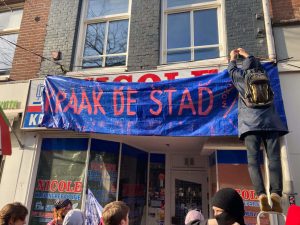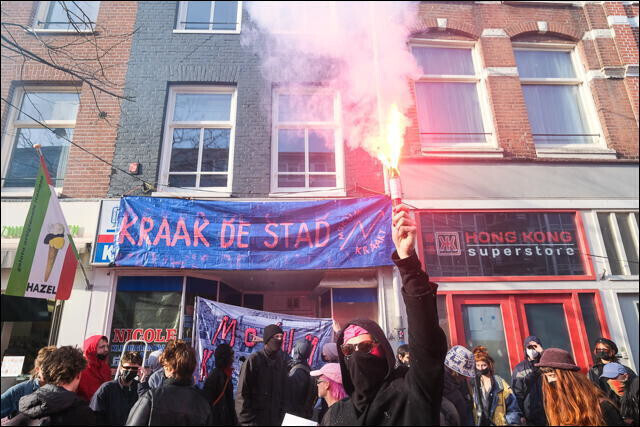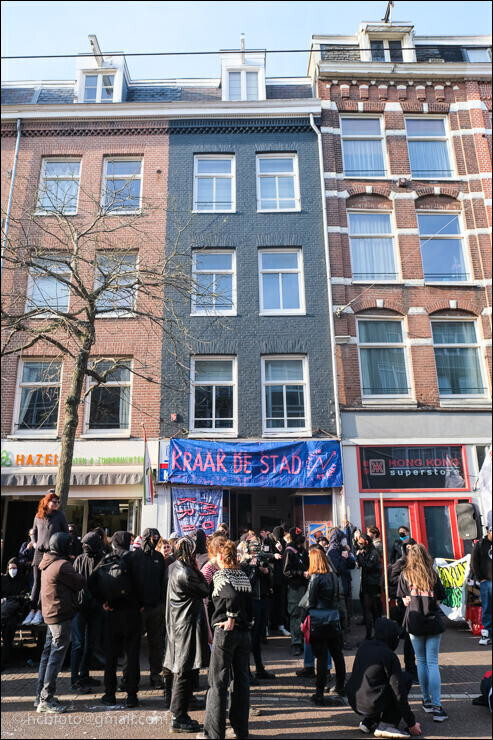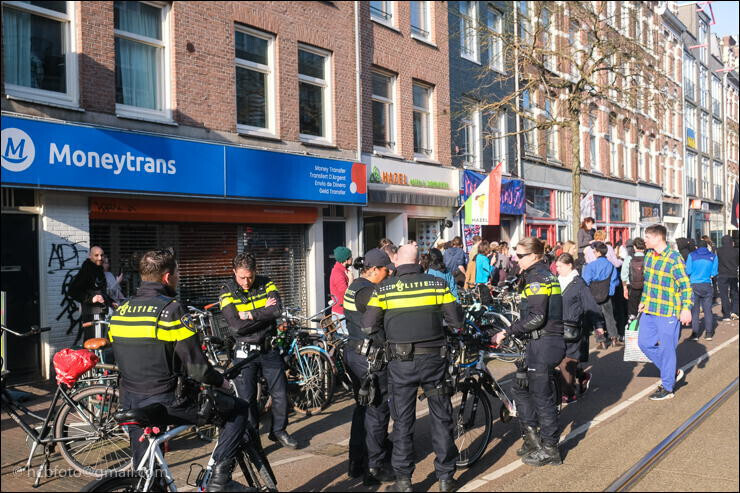 Statement from Mokum Kraakt on 13 March 2022 after the squatting of Kinkerstraat 304 ground floor.
Statement from Mokum Kraakt on 13 March 2022 after the squatting of Kinkerstraat 304 ground floor.
We are action group Mokum Kraakt. We are a mix of Hotel Mokum, Kinderen van Mokum and other squatters: young and old, experienced and new, but we’re all angry, full of love for Amsterdam and ready to fight for our city. Since 10th of march we are settled on Kinkerstraat, in one of the many empty shops in Amsterdam. Because Amsterdam belongs to its residents, not to big capital. We demand radical change. We demand accessible, livable and affordable housing. We demand a just and free city.
Underneath the clean and smooth streets, the city is collapsing. It’s almost invisible how the foundation of a lively city is beginning to burst under a layer of monoculture. In the cracks that Mokum Squats, spaces for counterculture are forming themselves. Spaces to experiment, to meet and to live.
The problem is that expensive appartments and hotels are being put above social rent, expats and tourists are being put above residents, repressive laws against squatting are being put above solutions for the housing crisis – and that’s how the city is on the verge of collapsing. Social rent houses are being sold on the private market for unaffordable prices. The local hub on the corner has disappeared because of the increasing rent. People with a migration background are being discriminated against in their search for a place to live and people with a disability cannot find accessible housing. Students are living in shoe boxes of which the roof is literally blown away by the wind.
The cause of the aforementioned examples is not just a matter of policy, incompetent politicians or a lack of houses. These are consequences. The real cause is the capitalist system in which we live. The generating of profit is prioritized by our government and municipality, instead of our safety. Especially people with a migration background, poor people, people with a physical or mental disability or undocumented people are at the receiving end of this system.
From a hotel to a launderette: our new home on Kinkerstraat 304 used to house the Nicole launderette but the owners, Sandstenen Projecten and Bas Boterbloem Beheer B.V. have left it empty for a long time. The Kinker neighborhood is symbolic for a city that gentrifies and caters more and more to yuppies. A city that only gives space to monoculture and to the superrich. Now we live here and we fund a free space for cheap culture, for art, autonomy and alternativeness, where discussions and meetings will take place. We will also organize things such as art expositions, movie nights and community dinners.
With this action, we put pressure on the upcoming municipal elections. We are at a societal crossover point and now – more then ever – the politicians of this city must stand up for its residents. Unfortunately, the majority of local parties barely offers any concrete or radical solution for the current housing crisis: even the so-called “leftist” parties aren’t even saying one word about the structural vacancy of buildings. While the worst housing crisis since the Second World War is upon the Netherlands, ten thousands of houses in Amsterdam are standing empty. In the ten years time that Rutte has been prime minister, the amount of homeless people has doubled. Almost a million people in their twenties are living at their parents’. Meanwhile, a new and severe law against squatting has been made to even further criminalize squatting. Starting july 2022, judges will have to handle squatting cases within 72 hours, with a priority over all other cases. This is undoable and judges as well as police have protested against this. Squatting is the only way for Amsterdam’s residents to take matters into their own account and find a roof above their head. The history of the city has been shaped by squatters and many of the cultural hotspots of Amsterdam originally existed through squatted places, such as Melkweg or Paradiso. It is unbelievable that squatting is now criminalized heavier while the dramatic need for housing and the structural vacancy of buildings is rampant all across the country. It’s poignant that buildings remain empty while people are sleeping on the streets.
What’s not allowed, is still possible. Illegal is not the same as immoral. We believe in direct action: on our own, with our own power, to struggle for change without being dependent of the permission of an institute or authority. At the moment, the law is designed to protect the right for private property more then the right for housing. As we’ve seen at the evictions of Waldeck Pyrmontlaan and J.C. van Hattumweg at the beginning of this march: violently, the right of owners to own something they don’t use is being defended, while the right for housing is being violated. So we break the law to show how unjust the law is.
At the eviction of Hotel Mokum, there was anger about the incomprehensible decision to evict. And there was grief about the loss of a symbol, a symbol that stood for a change in thinking about the city. Thankfully, there was also a lot of support and activist counter-sound, as well as people that cherished a good memory about the fact that alternatives are possible. The same can be said about all the people that used to love to come to Klokhuis, where there was always an atmosphere of creativity and free-mindedness. We haven’t forgotten these people. They have kept us going and they’ve proven to us that this problem is felt on a way broader scale then just by us. After years of budget cuts, isolation, an inhumane squatting ban and withering of the city, we will try our best to do everything to turn things around.
Now we’re here in the Kinker neighborhood, in a former launderette that was left empty and that was probably going to be replaced by an expensive patisserie or elitist shop for leather wear, as happened with other buildings of the same owner. That’s how an old working class neighborhood such as the Kinker neighborhood becomes a tourist hotspot, while residents are pushed away by increasing rent prices and replaced by richer people. This neighborhood, and Old West in general, is more and more becoming symbolic for the monoculture on the rise and the skyrocketing gentrification. Gentrification is hidden segregation and it more often affects people with a migration background, who are being pushed away by white peope with more money. The original residents – people of color, poor people, artists, students – that made a neigborhood cozy and cool, are pushed away to make the atmosphere they created more expensive and less accessible.
In the cracks that Mokum Squats, space for counterculture comes to life. Spaces to experiment, to meet and to live. We act against the housing crisis, the structural vacancy, the law against squatting and the city council that doesn’t stand up for its residents. We demand the following of local politics: finally start chosing the side of residents instead of the side of capital, now and after the elections. Make Amsterdam a squatting-friendly city. Give those who live in Amsterdam the representation they deserve and need, recognize the history of our city and ensure a radically new future. At the same time, we cannot wait for politicians to come around, because the crisis is now. So we ask our fellow Amsterdammers: fight for your city and for your rights. And if you can: help a bit, squat a bit! Let this city rattle and squat! MOKUM SQUATS!
Mokum Kraakt
Nicole, Kinkerstraat 304, Amsterdam, The Netherlands
https://squ.at/r/8g9h
https://mokumkraakt.nl/
Some squats in the Netherlands: https://radar.squat.net/en/groups/country/NL/squated/squat
Groups (social centers, collectives, squats) in the Netherlands: https://radar.squat.net/en/groups/country/NL
Events in the Netherlands: https://radar.squat.net/en/events/country/NL



